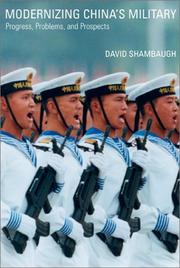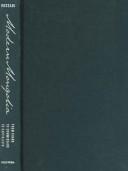| Listing 1 - 2 of 2 |
Sort by
|

ISBN: 1282357913 9786612357916 0520938100 1597347604 9780520938106 0585466173 9780585466170 9781597347600 9780520225077 0520225074 0520225074 9781282357914 6612357916 0520242386 9780520242388 Year: 2002 Publisher: Berkeley : University of California Press,
Abstract | Keywords | Export | Availability | Bookmark
 Loading...
Loading...Choose an application
- Reference Manager
- EndNote
- RefWorks (Direct export to RefWorks)
David Shambaugh, a leading international authority on Chinese strategic and military affairs, offers the most comprehensive and insightful assessment to date of the Chinese military. The result of a decade's research, Modernizing China's Military comes at a crucial moment in history, one when international attention is increasingly focused on the rise of Chinese military power. Basing his analysis on an unprecedented use of Chinese military publications and interviews with People's Liberation Army (PLA) officers, Shambaugh addresses important questions about Chinese strategic intentions and military capabilities--questions that are of key concern for government policymakers as well as strategic analysts and a concerned public.
China - Armed Forces. --- China - Defenses. --- China-- Armed Forces. --- China --- Armed Forces. --- Defenses. --- HISTORY / Asia / General. --- asia scholars. --- asian studies. --- china. --- chinese government. --- chinese history. --- chinese military. --- foreign policy. --- international politics. --- interviews. --- military buffs. --- military capabilities. --- military forces. --- military history. --- military issues. --- military power. --- military prospects. --- military strategies. --- modern history. --- modernization. --- nonfiction. --- peoples liberation army. --- pla. --- policymakers. --- political science. --- political. --- social progress. --- strategic analysts.

ISBN: 1597347590 1282358081 9786612358081 0520938623 1417585048 9780520938625 0520243994 9780520243996 0520244192 9780520244191 9781597347594 9781417585045 9781282358089 6612358084 Year: 2005 Publisher: Berkeley : University of California Press,
Abstract | Keywords | Export | Availability | Bookmark
 Loading...
Loading...Choose an application
- Reference Manager
- EndNote
- RefWorks (Direct export to RefWorks)
Land-locked between its giant neighbors, Russia and China, Mongolia was the first Asian country to adopt communism and the first to abandon it. When the Soviet Union collapsed in the early 1990's, Mongolia turned to international financial agencies-including the International Monetary Fund, the World Bank, and the Asian Development Bank-for help in compensating for the economic changes caused by disruptions in the communist world. Modern Mongolia is the best-informed and most thorough account to date of the political economy of Mongolia during the past decade. In it, Morris Rossabi explores the effects of the withdrawal of Soviet assistance, the role of international financial agencies in supporting a pure market economy, and the ways that new policies have led to greater political freedom but also to unemployment, poverty, increasingly inequitable distribution of income, and deterioration in the education, health, and well-being of Mongolian society. Rossabi demonstrates that the agencies providing grants and loans insisted on Mongolia's adherence to a set of policies that did not generally take into account the country's unique heritage and society. Though the sale of state assets, minimalist government, liberalization of trade and prices, a balanced budget, and austerity were supposed to yield marked economic growth, Mongolia-the world's fifth-largest per capita recipient of foreign aid-did not recover as expected. As he details this painful transition from a collective to a capitalist economy, Rossabi also analyzes the cultural effects of the sudden opening of Mongolia to democracy. He looks at the broader implications of Mongolia's international situation and considers its future, particularly in relation to China.
HistoryzMongolia. --- Mongolia - History - 1990-. --- Regions & Countries - Asia & the Middle East --- History & Archaeology --- East Asia --- Mongolia --- History --- History. --- HISTORY / Asia / General. --- Mongolie --- Economic conditions --- Histoire --- Conditions économiques --- asia scholars. --- asian studies. --- business and industry. --- capitalism. --- capitalist society. --- china. --- civic. --- commissars. --- communism. --- economic growth. --- economic history. --- foreign aid. --- history. --- international financial agencies. --- international relations. --- khans. --- minimalist government. --- modern history. --- money. --- mongolia. --- mongolian history. --- mongolian society. --- political history. --- political science. --- poverty. --- pure market economy. --- retrospective. --- russia. --- soviet union.
| Listing 1 - 2 of 2 |
Sort by
|

 Search
Search Feedback
Feedback About UniCat
About UniCat  Help
Help News
News